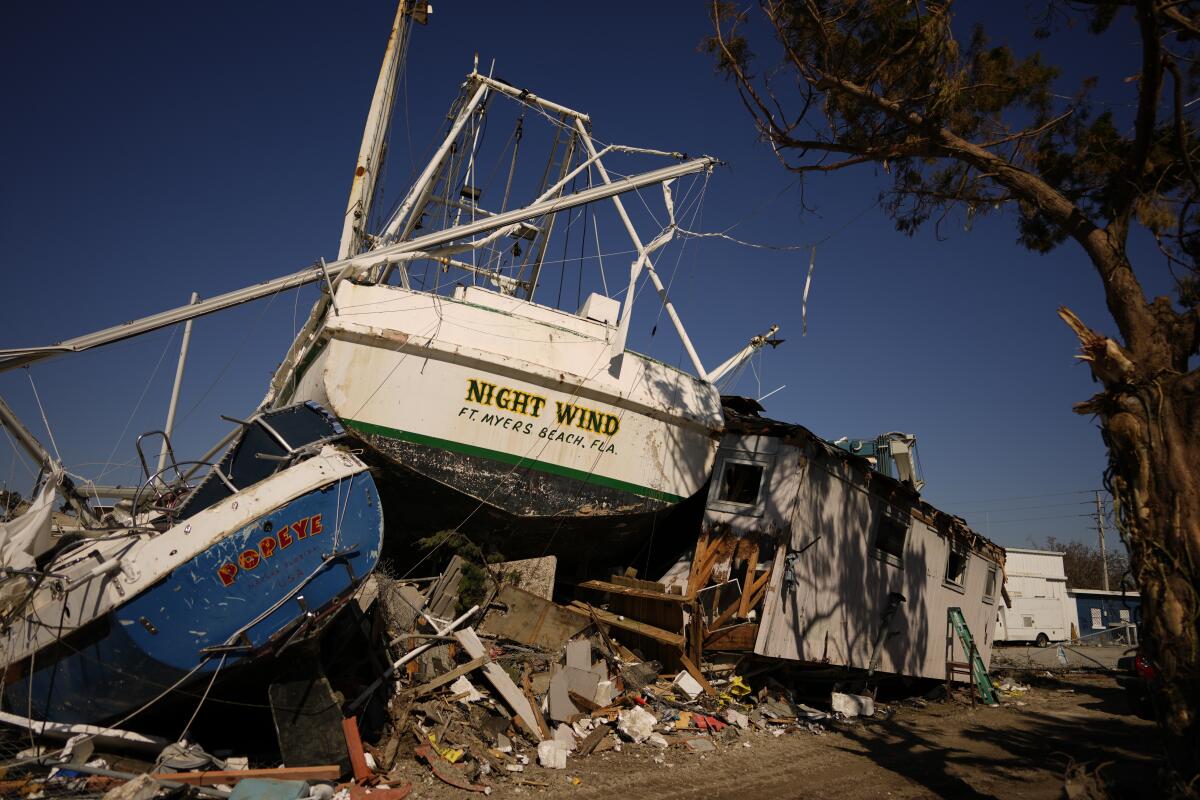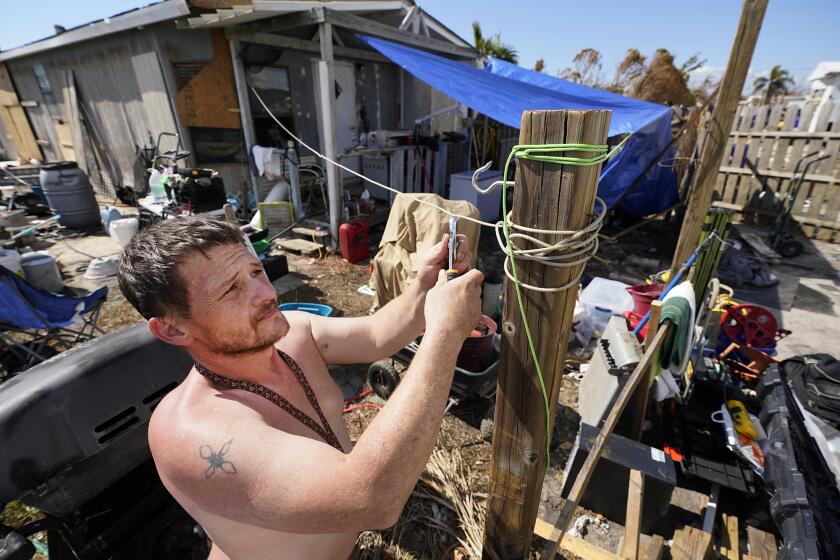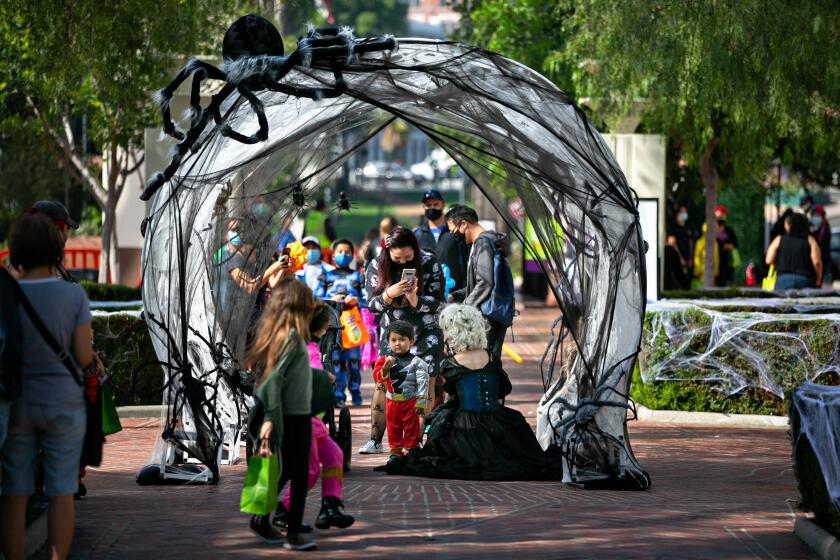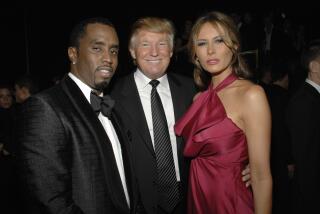Op-Ed: The pandemic, Hurricane Ian and me — a doctor whose friends say I have PTSD

- Share via
It turns out being stalked by a hurricane feels just like the eve of the pandemic, when we knew a storm was coming but little else. Both are slow-moving disasters at the beginning. Both can cause great death and injury, or not. You can be devastated or passed by without a touch for the most random of reasons, or for no reason at all. Both can be quickly forgotten.
Remember the viral hits MERS or COVID-19’s cousin SARS? Hurricane Bonnie in 1998 and, yes, 2022? Any of the three flu pandemics after 1918? Will Hurricane Ian make the cut like Andrew, Katrina, Ebola or AIDS?
Probably not.
There is a ton of denial in our society — COVID, climate change, outcomes of political elections. We have the ability to entertain and distract ourselves until the storm is right over us. We humans have a decent ability to psychologically shrug unless something happens directly to us or those we love. If not, we feel momentarily sad and then move on.
Survivors of Hurricane Ian face a long emotional road to recover from one of the most damaging storms to hit the U.S. mainland.
Maybe it protects us, this ability to throttle down our anxiety.
Without it I could never function as an emergency department physician. People close to me think I have PTSD from 2½ years of dealing with COVID, and they are probably right.
I live a bifurcated life, flying back and forth, practicing at UCLA and living part time in Key West, where I take care of a home in a place so beautiful that I refer to it as a saltwater Yosemite. But world capital Los Angeles seduces with better weather — spilled across a diverse landscape like champagne on a rumpled satin bed.
People often ask how I reconcile living in liberal L.A. and crazy-pants Florida. I tell them that the local newspapers cover the same issues: lack of affordable housing for essential workers and families, increasing crime and violence, homelessness, corruption and ineffective local government. They take note of a shared glum feeling that life is out of control, of communities turning inward and away from those different than they are, despite a history of diversity being celebrated in both places.
Passionate takes on “it was better here 10 (20, 30 years ago)” pop up in the Los Angeles Times and the Key West Citizen. While such perspectives are not necessarily true, I find it protective to keep politics, past and present, out of the conversation on the left-est coast and in the Gunshine State.
Ian has humbled Florida, and now there will be plenty of fraught political talk, a familiar echo of recent hard conversations.
We doctors were humbled by the pandemic. We fumbled communicating what we knew and did not know, giving the crazy theories and outright lies a chance to dominate and dilute good advice. People died because of it. We are still fighting that fight, despite great vaccines and treatments that work on patients from both sides of the political divide.
The result? Thirty percent of Americans remain unvaccinated, our life expectancy is down, and COVID is the third-leading cause of death in the U.S. Like Ian, it doesn’t care what our politics are or what state we are fleeing from. COVID is happy to mutate freely while we argue.
I’ve learned to muffle my panic, which is an essential pre-vaccine tool as useful as an actual N95, especially during the day of my flight when Hurricane Ian turned and made a curving run toward the Keys and Florida. I got one of the last flights out.
While waiting in a crowded terminal with bare-faced passengers seemingly unfazed by Ian, I felt a familiar upwelling dread. It seemed everyone had a sippy cup and a poker face. Mine was one of the few covered by a mask.
COVID? So last year. Have another drink.
Not on my flight. Impressed by towering purple clouds and a radar screen that looked like an abstract painting in angry reds, the pilots made everyone, including the cabin crew, strap in for the entire flight.
With the pandemic in a lull and plentiful resources available to help thwart the worst the coronavirus has to offer, there’s hope that fall and winter gatherings could be closer to normal for many Californians.
Eight hours later, walking out through Terminal 4, I didn’t notice that LAX had lifted its mask rule while I was away in south Florida, where wearing one was so rare that police might think you’d just robbed a bank if the light was wrong.
I was focused on getting to the curb, almost running into a tall gray-haired elderly gentleman headed the other way. We did a masked two-step, and he went by me. A second later, a loud voice hit me from behind.
“What’s up with the mask, old man?”
Tired and fed up, I spun around, thinking, “You talking to me?” Before I could go full De Niro, the tall gentleman was face to face with a young man in a red baseball cap.
Here we go, in L.A., not Florida. You can’t make this stuff up.
But the gentleman just said, “I have my reasons. You keep yours.” He turned away from the smiling bro and disappeared in the crowd. He was doing what we all need to do — to keep on trying to live an even-keeled life, even if we are changed by our experiences, storm or virus, or something else out of the blue.
Mark Morocco is a Los Angeles physician and professor of emergency medicine.
More to Read
A cure for the common opinion
Get thought-provoking perspectives with our weekly newsletter.
You may occasionally receive promotional content from the Los Angeles Times.









